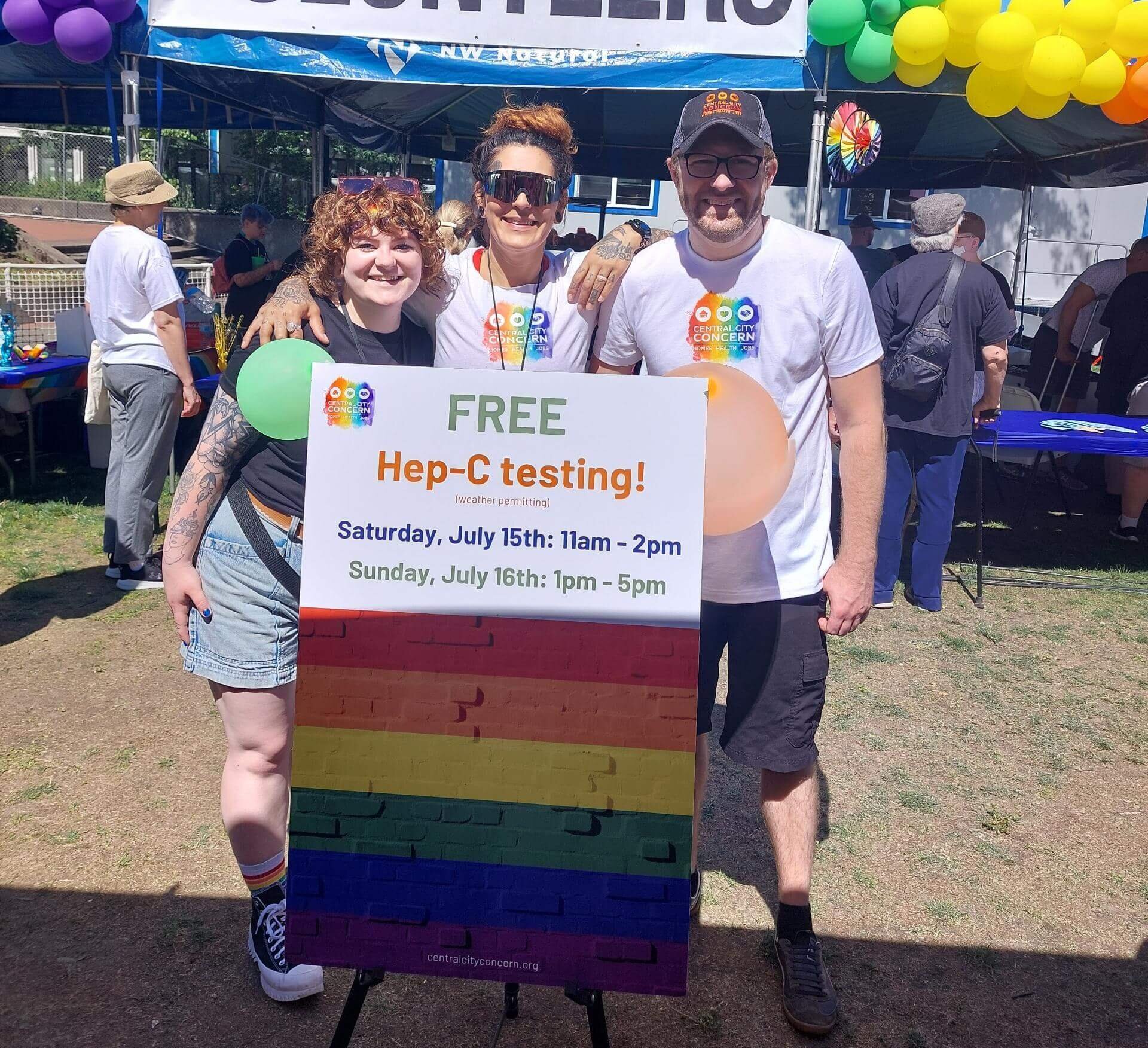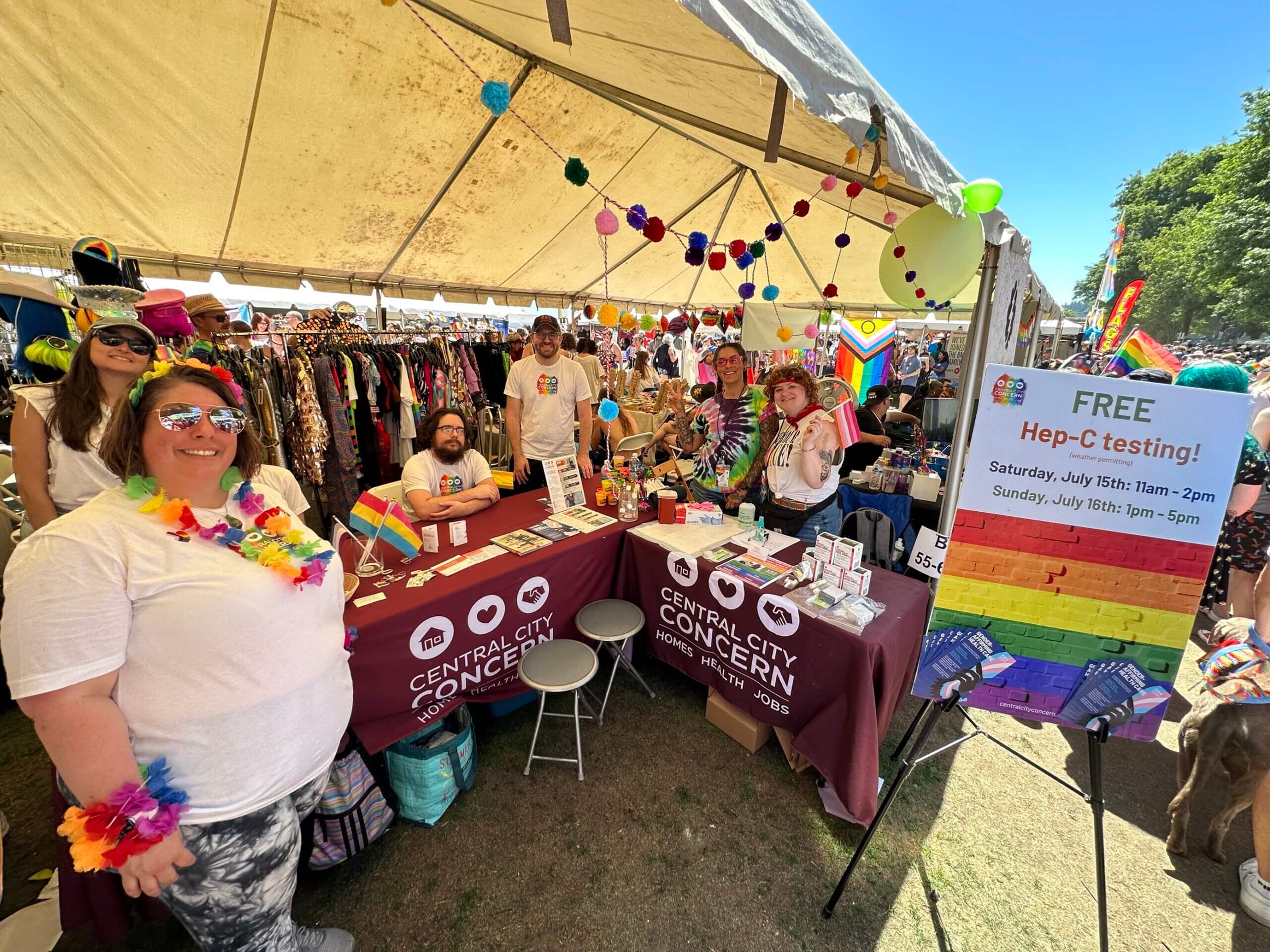World Hepatitis Day takes place every year on July 28 to raise awareness of the global burden of viral hepatitis. At CCC, we witness the profound impact of hepatitis C within the community we serve. People experiencing homelessness, residing in unstable housing or using injection drugs are at an increased risk of hepatitis C infection. Unfortunately, many people don’t know they’re infected.
Hepatitis C infects the liver creating serious, and, if left untreated, irreparable damage or death. According to a 2022 article published in BMC Global and Public Health, fewer than 20% of people experiencing homelessness who contract hepatitis C get treated.
Thankfully, treatments can now cure hepatitis C in most people. Treatment is simple, typically lasting 8-12 weeks. But ensuring access to testing and treatment for those most at risk can be a challenging task.
In response to this pressing issue, CCC took action by launching our hepatitis C program in 2017, initially providing testing services in our health clinics. Since then, we have continued innovating, with the ultimate goal of eliminating hepatitis C in our community.
Meeting People Where They Are
In 2017, CCC began offering hepatitis C testing for patients at Old Town Clinic, focusing on those at higher risk due to opioid use disorder. Testing was later expanded to Blackburn Center when it opened in 2019 and to Hooper Detoxification Stabilization Center in 2021. This has allowed patients to conveniently access testing and treatment where they already receive health care. Since May of 2017, 85.5% of all patients who have tested positive for hepatitis C in CCC’s program have received treatment—more than double the 2022 national average.
In 2019, CCC expanded its impact by doing outreach events at Transition Projects, referring people to CCC for testing. Unfortunately, patients were frequently encountering obstacles to treatment due to Medicaid’s prior authorization requirements. In response, CCC came together with community partners and began advocating for the requirements to be loosened. These collective advocacy efforts proved successful, and now, in 2023, there is no prior authorization required.
In 2022, CCC launched hepatitis C testing at CODA, one of Oregon’s largest substance use treatment programs. This innovative program has led to 1045 patients being tested and 65 being treated. Building on its success, CCC expanded the program earlier this year by incorporating three more sites, extending its reach and impact in the fight against hepatitis C.
Trauma-Informed Testing
CCC was able to effectively offer testing at opioid treatment programs thanks to a new way of diagnosing hepatitis C: dried blood spot testing. CCC played a pivotal role in bringing this innovative approach to the national market and remains the only organization providing dried blood spot testing at such programs.
This highly portable technology allows on-site testing through a simple finger poke, sparing patients from blood draws at phlebotomy labs. It’s especially beneficial for those triggered by needles, making it a more trauma-informed process.
Since 2021, CCC has expanded the use of this technology to offer testing at community outreach events and housing sites, enhancing accessibility. Recently, CCC even provided hepatitis C testing at Portland Pride!


Putting It into Practice
The impact of making hepatitis C testing and treatment accessible is undeniable. A prime example is one patient who underwent testing via dried blood spot at an opioid treatment center in late 2021. Unfortunately, the patient was discharged before we could relay the results due to returning to active use and being houseless. However, in early 2023, when the patient engaged with a hospital, CCC was alerted and they were discharged into CCC housing. Our housing outreach worker retested the patient, and in June 2023, after stabilizing in the new housing location, they were able to begin treatment.
Another patient tested positive via laboratory services in summer 2019, so the hepatitis C team worked with the CCC Summit Team (a clinical team dedicated to complex cases at CCC’s Old Town Clinic) to link the patient to care. Initially the patient was unmotivated to start hepatitis C treatment, but the CCC team along with Transition Projects, a community partner, continued contacting them for over a year. Their perseverance paid off, and in early 2023, the patient’s infection had been successfully cleared.
Clinical Pharmacy Services Manager Marc Rizzo, PharmD, said, “The hepatitis C team is flexible and adaptable to various changes. As pioneers in our field, we show bravery by innovative and creative problem solving while not knowing what obstacles we will face next. We also show a lot of persistence. A lot of patients start treatment 10-15 days after we find out they are positive, but we have success stories of linking patients to care after 500+ days.”
Since 2017, CCC has treated over 1500 unique patients. As a result of these testing and treatment innovations, hepatitis C rates among those tested by CCC have fallen by over 65% over the last six years. Thanks to the hard work of CCC’s award-winning hepatitis C team, we are eliminating hepatitis C in the Portland area.
Many people who have hepatitis C don’t know it. CCC makes testing and treatment easy.